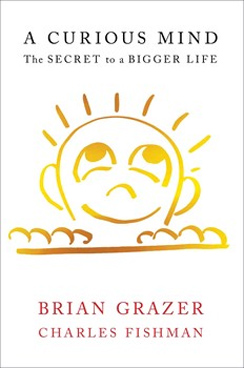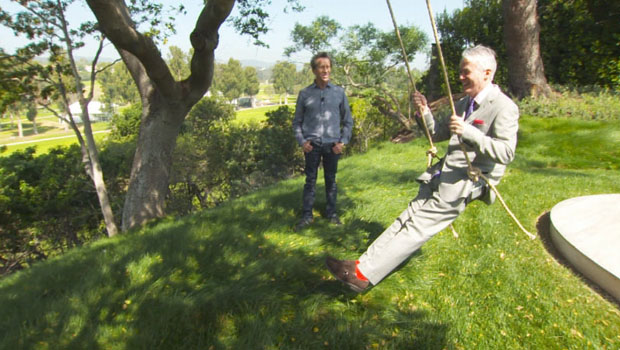Brian Grazer's "Curious Mind"
"Just curious" are no idle words for Hollywood producer Brian Grazer. Grazer talks about his eclectic search with our newest "Sunday Morning contributor," Scott Simon of National Public Radio, who begins by expressing a little curiosity of his own:
So, asked Scott Simon, with the utmost respect, "What the hell does a producer do?"
The Oscar-winning producer Brian Grazer laughed: "A producer is supposed to generate an idea for a movie. And then they're supposed to create the team, the group of people that are gonna make this movie. And within that team, the producer has to have a creative vision and a fiscal vision, and they have to adhere to both things."
"That's the most coherent answer I've ever heard," said Simon.
"Thank you!"
Grazer has made movies about astronauts trapped in space ("Apollo 13"), scholars who crack ancient codes ("The Da Vinci Code"), and geniuses with troubled minds ("A Beautiful Mind"). The films he's made have won Oscars, dazzled audiences, and earned more than $13 billion.
And he's produced television shows, including "24," "Arrested Development," and this year's breakout hit, "Empire."
Through it all, Ron Howard has been Grazer's friend and business partner: "It is kind of an odd couple relationship in a way," he said -- a relationship that's outlasted most Hollywood marriages (including all three of Grazer's).
"It's probably because we've never really taken it for granted," Howards aid. "We've never said, 'This is it for all time.'"
They met in the early 1980s: Grazer was an aspiring producer, Howard a sit-com icon who wanted to direct.
"We made two movies in a row -- 'Night Shift' and 'Splash' -- that were Brian's ideas that were creatively fun, exciting," said Howard. And they were successful.
How many "No"s did "Splash" get? "'Splash' got seven, eight hundred no's," said Grazer. "Because they didn't want to do a mermaid movie."
That "mermaid movie" made a splash ... made stars of Tom Hanks and Daryl Hannah ... and made Brian Grazer a surprise success.
Grazer had trouble reading as a boy. But his grandmother, Sonia, didn't just see the Ds and Fs on his report card.
"She identified my strength which was to ask questions, to dig inside of subjects, to dig inside of people," recalled Grazer. "She told me that that would have a great value in my life. And it did."
Grandma Sonia encouraged his curious mind.
"I think that we all absolutely have curiosity," Grazer said. "It brings about knowledge. It's energizing. It's spiritually empowering. It makes us more interesting as people."
Which is why, for 30 years now, Grazer has written notes to famous strangers to ask them to have what he calls a "curiosity conversation." He's talked to scientists, politicians, artists and entrepreneurs, like Jonas Salk, Oprah Winfrey, Steve Jobs, and Henry Kissinger. His new memoir, "A Curious Mind" (published by a division of CBS), is less about the famous films he's made than conversations he's sought.
Simon asked, "Why did you write this book and not a memoir?"
"I think writing a memoir in some way suggests that you've figured out life," Grazer replied, "and I definitely didn't figure out life. But I thought the process of curiosity was really worth writing about."
These conversations Grazer arranges can't be scripted to satisfaction: "I remember I used to ask Andy Warhol, 'Why do you keep painting Campbell's Soup cans? Do they look beautiful to you?' He goes, 'I like them.' He never answered any questions."
Dr. Edward Teller agreed to talk to him, even though the father of the hydrogen bomb told him he hadn't seen a movie since "Dumbo."
"Are you ever intimidated by anybody that you had one of these conversations with?" asked Simon.
"That's a good question. I've been intimidated, yes. I've been intimidated. The first one that comes to mind is George W. Bush, I was a little intimidated."
Not every conversation has a Hollywood ending. Grazer flew across the country to talk to Isaac Asimov, the science fiction writer, and his wife.
"They ordered two ginger ales, and by the time the ginger ales hit their lips they were saying, 'We're leaving.' I go, 'How could you leave?' 'Well, we can see you do not know enough about robotics or the subjects that live inside science fiction.'"
Were they right? Yes, said Grazer. "I don't think I knew enough about his work."
In 2001 Grazer and a few friends visited Cuba and had a conversation with Fidel Castro.
"He just speaks kind of nonstop without a breath," said Grazer. "But when he did take his first breath after about three-and-a-half hours, he did say, 'How do you do your hair?'"
Over the years, Grazer's electro-shock of hair has become -- like Castro's cigar -- a personal signature.
So, why the hair? "About 18 years ago I jumped out of a swimming pool with my daughter," he recalled, "And I popped my hair up, and my daughter goes, 'Oh my God, that's so cool!' I wouldn't know who I would be if I didn't do my hair like this!"
What he learns from his conversations may wind up in a film, but not directly. Grazer talked to Jim Lovell, the commander of Apollo 13. But it was his conversation with a Chilean activist named Veronica de Negri, who had been tortured, that made the story of survival in space come alive.
"We all knew before seeing that movie that they make it back," he said. "But it's how they make it back, how they reached inside of their own soul to find resources that they never thought existed, [that] was sort of the same thing that Veronica de Negri did when she was tortured in Chile. I met her probably 10, 12 years before that. So you often don't know how these little dots get connected when you're on this journey of curiosity."
Ron Howard came along on a few curiosity conversations, but just out of curiosity.
"These conversations are never about earning favors, or asking for any kind of business advantage," Howard said. "It's really an honest conversation."
Grazer's Beverly Hills home is airy, sleek, and tastefully plush. But he keeps a touch of boyhood in the backyard. The swing, he says, "has symbolic value. It completely connects to innocence and childhood and naivete and safety."
It's something Simon can't resist. "Forgive me, can I just take a little -- "
"Go for it!" said Grazer. "I love that you're doing this."
The swing looks like the gateway to a curious mind.
For more info:
- "A Curious Mind: The Secret to a Bigger Life" by Brian Grazer and Charles Fishman (Simon & Schuster); Also available in eBook, Unabridged Audio Download, and Unabridged Audio CD formats
- Follow @BrianGrazer on Twitter
- scottsimonbooks.com
- "Weekend Edition Saturday" - Hosted by Scott Simon (NPR)
- Follow @NPRScottSimon on Twitter

